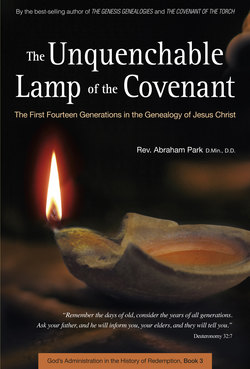Читать книгу The Unquenchable Lamp of the Covenant - Abraham Park - Страница 10
На сайте Литреса книга снята с продажи.
ОглавлениеForeword
As the third book in a planned series of twelve, The Unquenchable Lamp of the Covenant is a bright testimony to the marvelous gospel of Jesus Christ. Indeed, it is a bold witness to Jesus himself, the King of Kings and the Lord of lords, the One promised and long awaited in the history of redemption. This latest work from Rev. Park is a careful reading of the Gospel genealogies of Jesus that demonstrates the tremendous significance of the genealogies in revealing the providence of God in accomplishing the redemption of God’s people through the Lord Jesus.
The Unquenchable Lamp is a refreshing exposition for its assumption of the unity of scripture, the unity of history of redemption, in its big-picture approach that pays serious attention to the details. Also refreshing is the author’s obvious love of revelation and the Lord of revelation. Just as one theologian wrote, “the theologian who does not love God is in grave danger,” it can be asserted that the author of the The Unquenchable Lamp is a theologian who deeply loves God and his Word.
The Unquenchable Lamp is a beautiful and passionate exposition of the sovereignty of God as it unfolds the revelation of redemption in scripture. In this sense, the author persuasively shows this sovereignty in God’s works of redemption in a way that abstractly theologizing cannot convey. This is seen in the evidences of God’s sovereign choice of men and women who were ‘practically imperfect’ in every way, Jews and Gentiles alike as both vehicles and partakers of the gospel of the promises. That is, the gospel of redemption has since Eden been going to all the peoples on earth, without discrimination, as God’s mercy extends to the unworthy.
Most importantly, The Unquenchable Lamp testifies to Jesus Christ; it proclaims that Christ is utmost, pre-eminent in the history of creation and redemption. Rev. Park’s passion is to preach Christ and not himself (2 Cor 4:5). The Unquenchable Lamp lifts up Christ as the only One who can raise up men and women from the pits of pride and despair, from the curse of death and destruction. To that end, honesty pervades this work, yet not in an overly self-focused style so popular today, since all admissions of human frailty and failings are given only to magnify the Lord Jesus and to praise him and his glorious grace.
The Unquenchable Lamp is a superb example of Biblical Theology (in both senses of the word); it is theologically sound and it also seeks to trace out this story of redemption-history as scripture itself outlines and presents it. This is done through exposition of the often ignored genealogies of scripture, indicating a desire to take all of scripture as the Word of God. This is not to say that there will be no discussion or debate about some of the author’s exegesis or interpretations (especially when based on word studies), but that he has provided excellent material to stimulate much fruitful study of the Word. Even my limited knowledge of Rev. Park and his work assures me that he would never want his readers stopping with his word, but rather that his diligent research and writings would challenge us to study God’s Word more faithfully ourselves. This is the fruit of faithfully adhering to such an ideal in his lifetime of ministry.
The author writes with a pastor’s heart and an evangelist’s zeal, since he has long labored in love, prayer, and preaching for the church of the Lord Jesus. Yet even more than this, his writings extol the zeal of God for his divine purposes and his covenanted people. We become enthralled with God in this presentation in no small part because we are shown the power and love of God in fulfilling his ancient covenant promises to make a people for himself and to restore his creation through the Messiah. This God-centered approach is a much needed antidote to the selfism of our times, the me-centered nature of so much teaching and thinking. Rev. Park is to be commended for pointing us first and foremost to “the One who is, the One who was, and the One who is coming” (Rev 1:8).
I would be remiss not to mention the very fine maps, charts, and diagrams that compliment this work. These vital components, and the entire project, are consistently informed by the fruit of much archaeological, geographical, linguistic, and historical study.
In conclusion, in stark contrast to the widespread deleterious presuppositions of Historical Criticism, the verse that characterizes the edifying tone and assumptions of The Unquenchable Lamp is that “All Scripture is inspired by God and profitable for teaching, for reproof, for correction, for training in righteousness; so that the man of God may be adequate, equipped for every good work” (2 Tim 3:16–17).
Stephen T. Hague Academic Dean, Faith Theological Seminary
